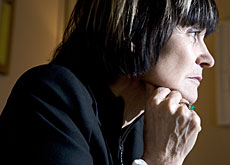UN human rights body rises to the challenge

During its first year in existence the new Human Rights Council faces three main challenges, Swiss Foreign Minister Micheline Calmy-Rey tells swissinfo.
She says the UN body – of which Switzerland is a member – must put in place efficient working practices and foster a culture of dialogue, without forgetting the plight of victims and crisis situations.
On the eve of the council’s first session, Calmy-Rey says she hopes the Geneva-based body will allow real progress in the defence of human rights.
swissinfo: What are the main difficulties the council is likely to face during its first year?
Micheline Calmy-Rey: This first year will essentially be one of transition. The council must establish an agenda, define procedural rules and draw up the process for universal peer reviews (examining the rights records of each UN member country).
Its biggest challenge is to find a good balance between organisational objectives – this council must be able to function according to clear procedural rules – and the council’s mandate. This must not be a lost year for the protection of human rights and emergency situations that could arise.
swissinfo: There is a higher proportion of countries resistant to defending human rights in the council than in the former Human Rights Commission. Isn’t there a risk that this Afro-Asian bloc will derail the council’s work?
M.C-R.: Representation by regional groups is in accordance with the rules of the UN General Assembly. No one has been able to change these rules.
That said, it is essential that we get away from the rationale of political confrontation and give dialogue a new chance. We don’t want a council in which a group of nations declares itself above suspicion and hands out lessons to others. No good could come out of such a situation.
Switzerland is in favour of an inclusive approach and a philosophy of partnership that breaks away from the exclusion and stigmatisation of the former Human Rights Commission. To achieve this, we need country representatives – ambassadors or others – involved in the process to assimilate this change in philosophy.
I also recall that council members have had to make commitments in support of human rights. They will have to answer to these commitments during their mandate.
swissinfo: Is it possible to have dialogue with authoritarian regimes on the issue of human rights or is this simply a pipe dream?
In a multilateral setting, you need to find a good balance between pressure and dialogue. In this sense, the universal peer review should become a good instrument. Switzerland is ready to ensure that this becomes reality.
On the bilateral front, Switzerland is in dialogue on human rights with Vietnam, China and Iran, addressing issues such as the death penalty and detention conditions. The results are not always what one would want in an ideal world but we are seeing progress and Switzerland has always considered it worth persevering along these lines.
In addition, it would appear that respect for human rights – social as well as civil and political rights – is essential for development. I think that this view is gaining ground.
The proof of this can be seen in the re-evaluation of the issue within the UN system. The Human Rights Council answers directly to the General Assembly. This was the wish of the whole international community.
swissinfo: What impact will the council have on Switzerland and Geneva?
Today Geneva can be called the capital of human rights and international humanitarian law. The city is home to the Office of the UN Commissioner for Human Rights and the Red Cross and Red Crescent movement.
There is therefore a very significant capacity for synergy and development. This dynamic has been reinforced by the creation of the Human Rights Council. On a material level, this will also result in job creation. The Office of the High Commissioner for Human Rights will grow in size from 300 to 700 employees.
Also, Switzerland – as host country for the council – is committed to making office space and other infrastructure available for delegations that do not have missions in Geneva. Around 15 delegations will benefit from this.
This also applies to non-governmental organisations, which will have to have a stronger presence in Geneva as the council will meet several times a year.
swissinfo-interview: Frédéric Burnand in Geneva
Switzerland was elected to the Human Rights Council with a three-year mandate on May 9. The vote took place at the UN General Assembly in New York.
The mandate can only be renewed once. Switzerland must then cede its place to another country from the western group, before being able to stand for election again.
Forty-seven countries will sit on the council, which sits for the first time in Geneva on June 19.
The council will meet at least three times a year for no less than ten weeks, and can convene emergency sessions. Its predecessor, the Human Rights Commission, met for just an annual six-week session.

In compliance with the JTI standards
More: SWI swissinfo.ch certified by the Journalism Trust Initiative










You can find an overview of ongoing debates with our journalists here . Please join us!
If you want to start a conversation about a topic raised in this article or want to report factual errors, email us at english@swissinfo.ch.